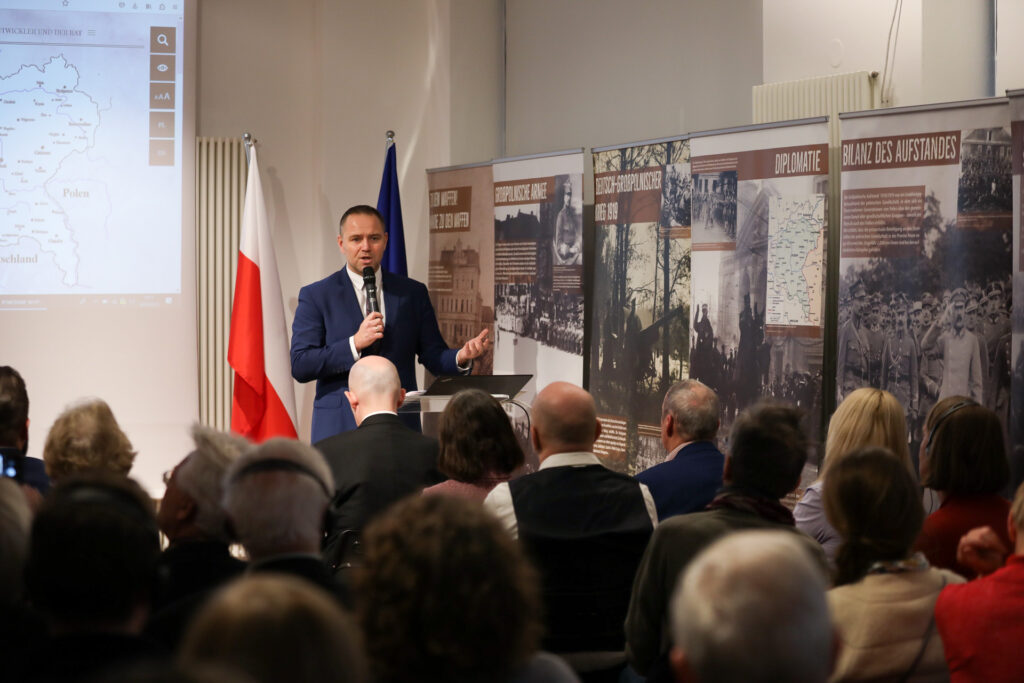
At the headquarters of the Polish Institute in Berlin at Burgstraße 27, the operation of the History Point of the Institute of National Remembrance was inaugurated. The event was attended by, among others: Dr. Karol Nawrocki – President of the Institute of National Remembrance, Paweł Gronow – First Counselor and Deputy Ambassador of the Republic of Poland in Berlin, Marcin Król – Consul of the Republic of Poland and Marzena Kępowicz – Director of the Polish Institute in Berlin.
“Many contexts meet us today in the capital of Germany, Berlin. Contexts related to the difficult history of two nations – the Polish nation and the German nation. They accumulate around dates, around events, around emotions, around wars, around the past and the future” – dr Karol Nawrocki said during the opening.
Referring to the difficult history of Polish-German relations and the emotions that follow them, the head of the Institute of National Remembrance drew attention to the importance of truth and the purpose behind the opening of IPN History Point in Berlin.
“We are here, Ladies and Gentlemen, to be able to tell the truth. To tell the truth, not only historical and scientific, which is supposed to bring a sense of security, or sometimes even carefree in the 21st century, but the truth for a better future of the European community, the NATO alliance against threats, from the modern world” – he said.
The date of the inauguration of Berlin’s IPN History Point – February 14 – was not accidental – as February 16, 2023 was the 104th anniversary of the truce in Trier, which ended the Wielkopolska Uprising. That is why the independence uprising of Wielkopolska residents became the main theme of the event. As historians from the Institute of National Remembrance recall, February 14 is also the anniversary of the renaming of the Union of Armed Struggle into the Home Army. Many insurgents from Wielkopolska were involved in the military and civilian structures of the Polish Underground State. Their conspiracy efforts included activities undertaken not only in the area of the so-called Wartheland, but also other territories of the occupied Second Republic of Poland, with particular emphasis on Warsaw and the General Government.
The ceremony in Berlin was honored by Wolfgang Templin, a well-known German publicist and activist of the democratic opposition in the GDR, with his lecture on the Wielkopolska Uprising seen from the perspective of German historiography. In addition, the gathered guests could listen to a short concert of the guitar virtuoso Łukasz Kuropaczewski and see the exhibition “Wielkopolska Uprising 1918-1919”.
The visit was accompanied by establishing contact with representatives of German institutions for further cooperation. The talks were led by Łukasz Witek, director of the History Point Office, and Agnieszka Jędrzak, director of the International Cooperation Office.
As its representatives emphasize on the website of the Institute of National Remembrance, “History Points abroad are more than just meeting places. They are points on the world map where Poles can feel the common history, values and bond with their homeland.” “In Foreign History Points, our educators, scientists and archivists present, during workshops, lectures and meetings, the wide educational offer of the Institute of National Remembrance, present the results of the latest research, and also acquire priceless memorabilia of Polish emigrants for the “Archive Full of Memory”.First foreign IPN History Point was launched in Vilnius in 2015. Soon, more were created, including in Lviv, Brussels, New York, Minsk, Grodno, Chicago, Daugavpils and London” – they list.
AW/IPN
